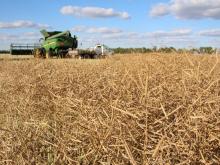Canada’s canola industry is expressing deep frustration over the federal government’s newly announced support package, saying it fails to meet the urgent needs of farmers and the broader value chain affected by the ongoing closure of the Chinese market.
While industry leaders welcomed the government’s attention to agriculture, they say the measures announced on Friday do not reflect the scale of the crisis.
"Let me start on a positive note: it’s good to actually have a federal government that’s talking about agriculture generally and canola specifically. That’s not something we’ve always had, so we’re certainly appreciative of that," said Chris Davison, president and CEO of the Canola Council of Canada (CCC). "However, I have to say that the measures announced today (Friday) do not meet the moment that the Canadian canola industry is facing."
The closure of the Chinese market to Canadian canola seed, oil, and meal has created what Davison described as an 'unprecedented trade disruption.' He noted that while several provisions were announced, including changes to the Advanced Payments Program (APP), they fall short of providing meaningful relief.
"One of the measures is financial support for farmers through changes to the APP," Davison explained. "But essentially, that’s going to require canola growers to assume additional debt, which has to be paid back. That’s appropriate in certain circumstances, but only if those farmers have markets to sell into."
Rick White, President and CEO of the Canadian Canola Growers Association (CCGA), echoed those concerns: "Farmers should not be expected to borrow their way out of this situation. The APP is not designed to provide the required support canola farmers need under this situation."
Davison also emphasized that the federal response overlooks the broader canola value chain. "The financial measures don’t recognize the extensive impacts on exporters, processors, and others who are also facing very significant financial impacts as a result of the Chinese market closure."
The industry did acknowledge some progress with the introduction of a Biofuel Production Incentive (BPI), but Davison said it doesn’t go far enough.
"We’re very excited about what biofuels represent in terms of opportunity for the Canadian canola industry. The BPI will go a certain distance to address competitiveness concerns, but it doesn’t really drive meaningful additional demand for domestically produced canola. That’s the concern we have, and hopefully that’s something we can build on."
Another major concern is the lack of clarity in the Clean Fuel Regulations regarding foreign used cooking oil (UCO), which displaced nearly one million tonnes of domestic canola demand in 2024.
Looking ahead, Davison stressed the importance of resolving the trade dispute with China. "Priority one remains having the federal government pursue all avenues to reopen that market,” he said. “We’ve got farmers in the field right now harvesting this year’s crop. The sooner we can resolve this issue and bring certainty back to the marketplace, the better it is for everyone—from the farm gate forward."
Recent developments, including China’s extension of its anti-dumping investigation into Canadian canola seed until March 2026, offer a glimmer of hope. However, Davison noted that punitive duties remain in place 75.8 per cent on seed and 100 per cent on oil and meal effectively keeping the market closed.
"We’re somewhat encouraged by recent engagements at the federal level," Davison said, referencing Premier Scott Moe’s upcoming trade mission to Asia and the reactivation of the Joint Economic and Trade Commission between Canada and China. “We’ve said the issues we face are political and require a political solution. These steps are part of re-establishing regular, pragmatic communications, which are essential to resolving the trade issues."
